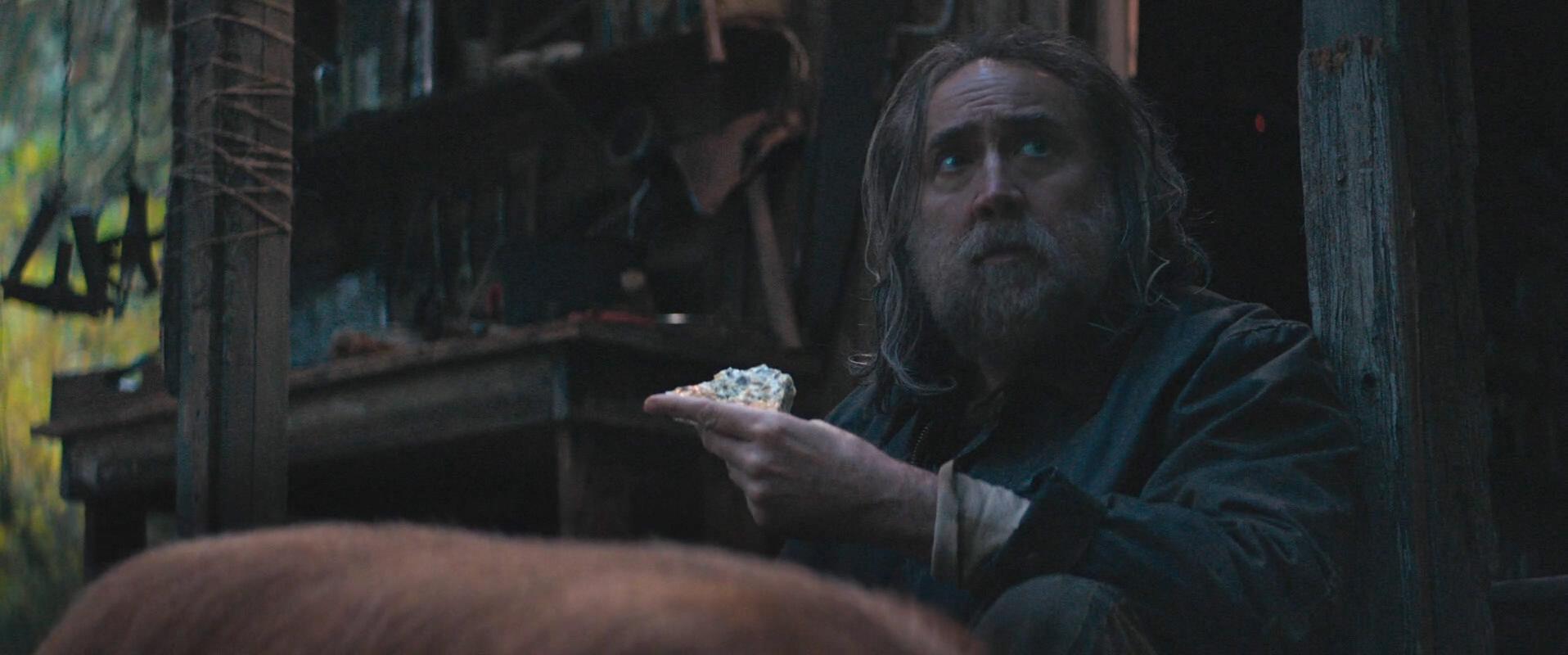Pig (2021): A Movie Review
An uplifting, apocalyptic meditation on love, loss, and what matters in life.

Before Pig, my last trip to the cinema was to see The Unbearable Weight of Massive Talent. In that movie Nicolas Cage plays himself, dialling up all the flamboyant aspects of his acting persona to eleven in a knowingly wacky, introspective, and ludicrous way.
That movie is somewhere close to maximum Cage, and if that sounds like fun to you, it will be — and it was to me. Though the chance to write a full review escaped me, I enjoyed that movie quite a bit.
It did give me pause before seeing Pig as my next cinema trip, though. Could I handle back-to-back Cage-heavy movies and come out with my sanity intact? Would it feel like I was living in a surreal alternate universe, where Cage stars on all screens, in every movie complex, playing a thousand different roles? Would it fall under that tiresome, all-purpose criticism: of being “too much?”
Something told me to go anyway, damn the torpedos — and I am glad I listened to that something.
In Pig, Cage plays the part of Robin Feld, a truffle farmer and former chef of renown, with a restrained quietness. Instead of flamboyant, he is depressed, heartbroken, quiet-spoken, and surprisingly clear-minded. Robin left the city and his career as a chef behind more than a decade before, we are told. He now lives in the forest, in a ramshackle hut with his adorable and talented truffle pig.
I know. This sounds exactly like a crazy, dialled-up Cage movie, with shades of Mandy. But somehow, it is not. It has a surprisingly subtle energy under the surface, and the script drives the movie as much as anything else. In a sense, Cage takes a back seat despite being in almost every frame. He is hidden behind an unruly beard, layers of dirt and blood, and a hesitance to verbally communicate after living like a hermit for more than a decade.
Pig is a small film, taking an extreme close-up of one or two facets of human experience and holding it there. It studies a simple emotional colour palette. One or two tones, subdued, bleak, natural, played softly and repeatedly. It is also a slow burn. Though the first half held my interest, the final act really brought the picture into focus and lit my mind up.
It will probably not be considered a masterpiece. “Cult classic” is much more likely. However, it is masterful in the way it meditates on a quiet, bleak mood, positioning the viewer with Robin from an outside view of civilisation (which frankly, a few of us could use right now), until something beautiful rises like intricate forms of scented smoke from the ashes.
The plot is as high concept as they come. Robin lives with a pig in the woods. That pig is stolen from him and taken to the city. Robin sets about recovering it, taking him back to the city, where we learn more about his past.
Subverting genre expectations is a big part of what sets the movie apart, and creates a mood of mystery. The story flirts with the tropes of a revenge plot, using its typical structure like smoke and mirrors while something different is being prepared in the kitchen.
The mood, like the plot, is very simple. Robin has given up on humanity, and on people, though he has arrived there with his eyes wide open. It is spiritually post-apocalyptic.
He remembers everything about his previous life with startling clarity, and we see that his capacity for empathy is unimpaired, though buried under a mountain of cynicism. He can look anyone in the eyes, see their soul, and explain it to them without malice, but also without pulling any punches. He never makes an insincere remark.
In the same way film noir came into being from the cynicism of the post-WW2 world, this feels like the product of a post-pandemic, post-Trump, post-war in Europe world.
Despite seeming (underneath the appearance of a bloodied hobo) like an intelligent, in some ways meticulous man, the state of the cabin where Robin lives stretches the definition of habitable living conditions. The reason he lives this way is clear enough: he has no hope, so he sees no point in doing most things. We quickly surmise that he has lost a love of priceless value, and he now simply loves his truffle pig. He has transferred his heart and soul into it, like a vessel to store it in.
What deflects the tone and narrative is seeing that, despite the abysmally bleak cloud that envelops him, he neither gives up nor gives in. He does not give in to violence and hatred in response to the things he loathes, or the things that have been done to him, and he does not give up in the sense of failing to fight back against the evil that crosses his path.
The slime of the city he left behind reaches its tentacles into his remote cabin in the woods via the single active connection he maintains with the modern world: selling fresh truffles to a restauranteur with city connections. This indirectly leads to the only thing he still loves being taken from him. His truffle pig.
If the plot could be considered a revenge plot, Robin’s revenge is to speak clearly and unapologetically with disappointment and compassion to those who have wronged him, to reveal their own corrupt and twisted natures to themselves. Which, actually, turns out to be a beautiful form of revenge, and one that is cathartic to see on screen.
Two things struck me as remarkable about the movie. The first is the tone: oddly serene, forlorn, hopeless, deeply humanistic, and cynical. The second is how this bleak world building is used as a vehicle to deliver a message of love.
Robin offers food, and takes food, as an unspoken gesture of simple love. He has no time for dressing it up as something else, or something fancy. This appears to be the source of his skills as a chef, which are still reverently whispered about fifteen years later. His way of being is what he puts into his cooking: honesty and love, in equal measure. He is a famous chef rooted in the true spirit of home cooking.
When he likes and trusts someone as having a good heart, he communicates to them in a simple, underspoken way. He naturally commands respect from the right people, we come to realise, and deflects misplaced contempt from others — who seem mostly to resent his implicit but unapologetic rejection of their way of life. He wonders the city, dining in upmarket restaurants, dressed like a hobo and with dried blood on his face and crumbs in his beard (which is a little OTT, but also gives the story a surreal edge).
In a great piece of dialogue where he addresses someone he once briefly employed (and fired for incompetence), who has since become a successful but pretentious chef, he boils his point down to a simple motto, which the film takes as its tagline:
‘We don’t get a lot of things to really care about.’
He has arrived at the conclusion that most things in life are bullshit. All that matters are the few things that are not. Since those things have been taken from Robin, it feels nihilistic — but, he is trying to help others see themselves, and see what matters.
There is a sort of showdown with a profoundly incompassionate individual, who has lived a life based on cold and calculated self-interest. Expertly confronted with the face of authentic love and joy of life, it produces a moment that, though not played up for drama, is powerful and memorable. There are a few moments like this, and Cage makes them land.
Though it takes on big themes, this is a small movie, and all the better for it. The experience in the cinema was, for me, an emotional palette cleanser that came at a welcome moment. I hope others see the movie in the same way, and take the same thing from it.
It is also one of those movies that hits you in the tear ducts just as the credits are about to roll and the lights are about to come up. The last time that happened to me in the cinema was The Father. And, ahem… I swear it was not just me slow to get up from their seat. The soundtrack list took on a special interest to everyone.
As for the Cage performance? I think the contrast between this and The Unbearable Weight of Massive Talent reveals an under-appreciated range in his acting ability. I might as well have watched two films starring two different actors.
Cage almost always goes weird, but he is extremely diverse in his weirdness.
James Lanternman writes movie reviews, essays, and moonlit thoughts. You can reach him at [email protected].
Previously… Licorice Pizza (2021): A Movie Review
